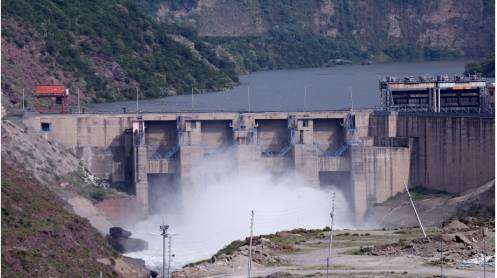NEW DELHI/ISLAMABAD: India is reportedly considering drastic measures to curb the water flowing into Pakistan from the Indus River system, in response to a deadly April attack in Indian-administered Kashmir that New Delhi blames on Islamabad. According to multiple sources familiar with the matter, Indian Prime Minister Narendra Modi has directed authorities to fast-track plans to harness more water from rivers allocated to Pakistan under the 1960 Indus Waters Treaty.
Following the attack that killed 26 civilians, India “put in abeyance” its participation in the treaty and has yet to resume engagement, even after a recent ceasefire between the two nations. Modi has intensified efforts to implement projects on the Indus, Jhelum, and Chenab rivers, which are reserved primarily for Pakistan’s use under the treaty.
Among the plans under review is the expansion of the historic Ranbir Canal on the Chenab River. Officials suggest the canal’s length could be doubled to 120km, increasing water diversion from 40 to 150 cubic meters per second. This could drastically impact Pakistan’s Punjab region, where about 80% of agricultural activity depends on the Indus system.
Engineer Arshad H. Abbasi, a leading Pakistani water expert, has raised urgent alarms in his report “Chenab at the Crossroads: A Plea for Preservation over Exploitation.” He warns that India’s increasing hydropower activities in Himachal Pradesh and Jammu and Kashmir—including 49 hydro projects and tunnel constructions—pose a dire threat to the Chenab’s flow.
India’s experience in constructing major tunnels like the Baguru Navile and Zoji La is enabling projects that could link the Chenab to the Ravi and Beas rivers, redirecting water to the Ranjit Sagar Dam. A tunnel boring machine is already active near the Tawi River, reducing Chenab’s flow, reports indicate.
Abbasi also highlighted the strategic and ecological implications of the Gyspa Dam project, designed to transfer water through a 23-km tunnel into Solong Nala. He describes it as a blatant violation of the Indus Waters Treaty and warns of severe consequences for Pakistan if construction proceeds unchecked.
He further criticized the inaction of Pakistani authorities, NGOs, and diplomats who, he alleges, have downplayed the severity of the crisis under the pretext of climate change narratives.
Pakistan’s Foreign Minister Ishaq Dar has termed India’s suspension of the treaty “unlawful” and reiterated that Islamabad still considers it in force. However, India’s Water Minister C.R. Paatil recently echoed Modi’s hardline stance, declaring, “not a drop of water goes out.”
With five major Indian hydropower projects—Ratle, Pakal Dul, Kiru, Kwar, and Parnai—set for completion by 2026, Abbasi warns that the coming year is critical. He fears that if India’s tunneling and diversion projects continue, the Chenab may shrink to a mere trickle, depriving Pakistan of a lifeline crucial to its food security and energy production.
As climate change accelerates glacial melt in the Chenab basin, the geopolitical and ecological stakes of water in South Asia have never been higher.
Story by Khalid Mustafa







